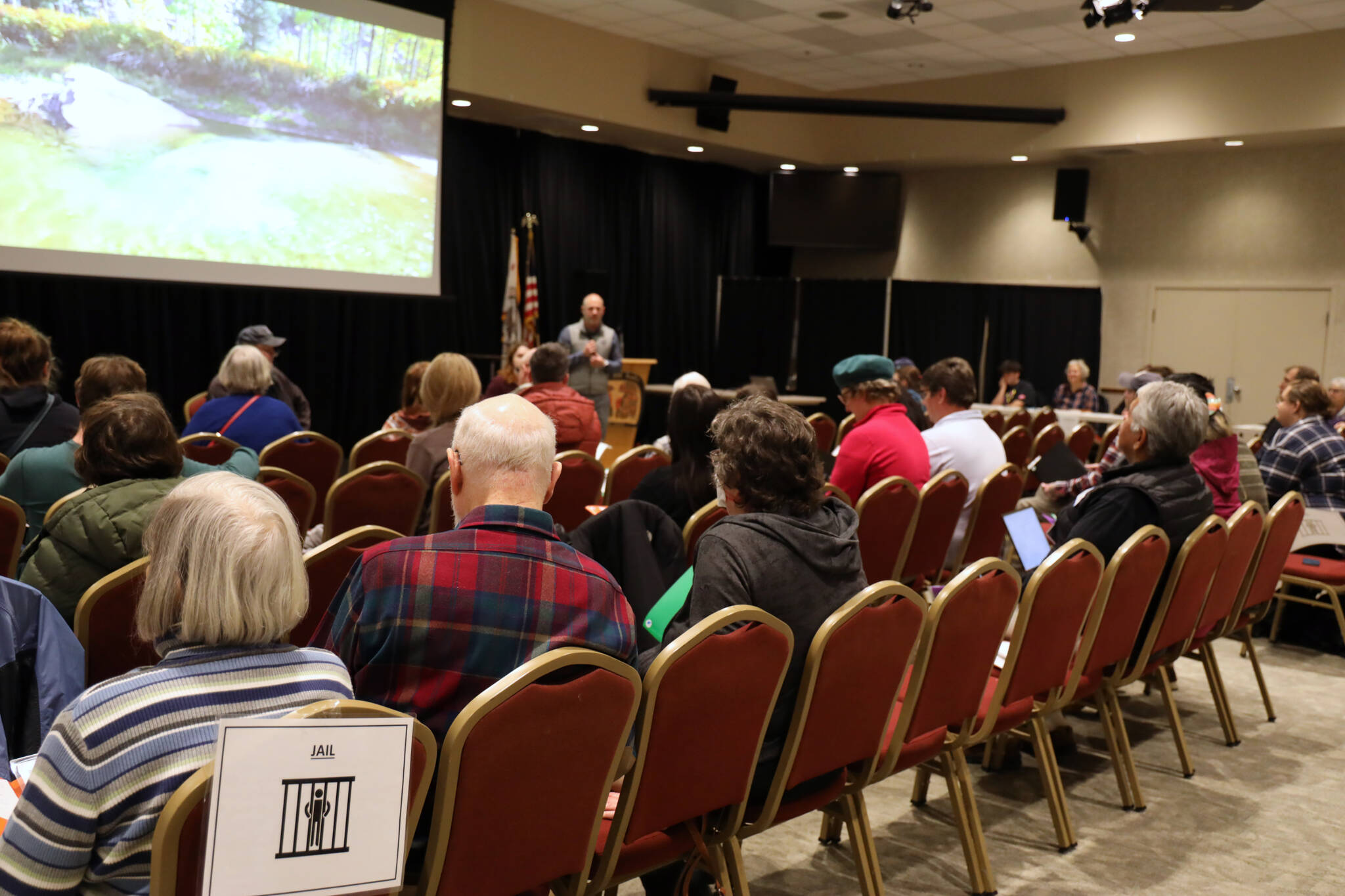Finding affordable housing and transportation can be a challenge for anyone in Juneau — for recently released incarcerated people it’s even more difficult and only adds to the numerous other hurdles and hardships they have to overcome to reenter society.
On Wednesday afternoon the Juneau Reentry Coalition hosted a reentry simulation at Elizabeth Peratrovich Hall with the goal to educate Juneau residents about the myriad challenges people face after being released from incarceration back into the general public.
The group of around 30 people who participated and simulated the life of a person reentering society used fake money, bus passes and items to pawn during the hour-long activity in an attempt to understand the burdens and difficulties that many people face as soon as they are released.
Though at the end of the day it was merely a few-hour activity for the people who attended, for residents like Rocky Stiers, a volunteer at the event who was released from Lemon Creek Correctional Center in late September, the struggles of reentry are his constant reality.
“There’s a lot of hoops to jump through,” he said. “It’s application after application, approval after approval. I think it’s even harder than what this simulation represents.”
Stiers was released from Lemon Creek Correctional Center just over a month ago after serving a three-year sentence for drug charges. Stiers has spent around 10 years in prison during his life and has tried to re-enter society four times. He said the past three have been unsuccessful, but he hopes this time will be different.
Stiers said he decided to volunteer at the event to share his story and educate people about the struggles he and other incarcerated people go through once released. He said though the simulation was only a few hours long for those who participated, reentry is a constant reality for him and he wants to break the cycle.
According to a 2018 study released by the Department of Justice, about 68% of people released from incarceration in the U.S were incarcerated within 3 years of their release, followed by 79% within 6 years, and 83% within 9 years. The recidivism rates were lowest among Asian, Native Hawaiian, or other Pacific Islander prisoners at just under 80% and highest among black prisoners at just under 87%.
Don Habeger, Juneau’s Reentry Coalition Coordinator, said though the simulation is an extreme truncation of the steps and struggles many people face when reentering society, he emphasized the importance of bringing more community education and dialog as a vital step to raise more awareness about barriers in place that are holding many people back from being successful after incarceration.
“It just illustrates reentry is not a piece of cake,” he said. “It just allows our community to understand some of the gaps and barriers in reentry and see for themselves how the struggle that it is to re-enter if you come out of interaction with very little resources and try to put all those little things together.”
Habeger said he hopes by inviting residents from all sides of Juneau people can show more empathy for people struggling and advocate for change, and urged people to get involved in the coalition or community if they want to help.
“Once you can understand some of the struggles, you can do things like write a letter to the assembly, talk to your neighbors, and help look for solutions that benefit the community,” he said.
Habeger said one of the biggest barriers in Juneau is the lack of affordable housing, and said taking steps to address the lack of housing, specifically low-income housing, would be a major aid to people in Juneau struggling with reentry.
City and Borough of Juneau Assembly members Michelle Bonnet Hale and Christine Woll agreed and said affordable housing is a major priority for the Assembly. The pair were the only two Assembly members who participated in the simulation, Hale as a probation officer and Woll as someone reentering back into society.
Both Hale and Woll said the event was eye-opening and said it made them think about what the Assembly can do to change certain city policies that could alleviate certain obstacles.
“It’s another reminder of how hard it is to get a leg up,” Woll said.
Both pointed to transportation as a major obstacle that stops many people from being able to do the necessary tasks to maintain their reentry and livelihood.
While Woll said she would like to look at how the Assembly can further make public transportation easier to access by “keeping prices affordable,” Hale took a more aggressive stance and said she would like to see the city provide free bus services in the future.
Woll said she is interested in continuing to look at other ways that the city could pursue to help people trying to reenter, and pointed to the possible removal of food sales tax as a step the Assembly could take that would directly impact people trying to reenter. In early August, the Assembly OK’d $40,000 toward a survey of Juneau residents on the question of whether the city should consider removing the sales tax on food.
Stiers said he hopes the event inspires people in the Juneau community to show more empathy and compassion for people trying to enter back into the community and to reach out and help them.
“It’s a struggle — life is just a lot, even if you’re not trying to reenter society,” he said. “So you’re facing all these burdens and restrictions on top of it and It’s not easy — it feels almost impossible.”’
• Contact reporter Clarise Larson at clarise.larson@juneauempire.com or (651)-528-1807. Follow her on Twitter at @clariselarson.

